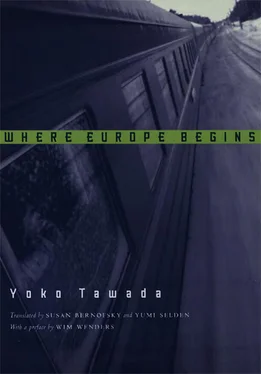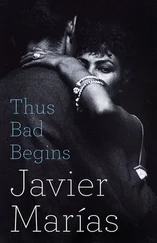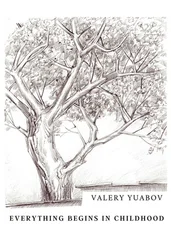My tongue is always somewhat swollen when I wake up, much too large to move easily within my mouth. It blocks my windpipe, I can feel the pressure building up in my lungs. How much longer do I have to suffocate? I wonder, and at once it begins to shrink. At such moments, my tongue reminds me of a worn-out sponge: dry and stiff, it retreats into my esophagus, dragging the rest of my head behind it.
Once in a dream I was standing on a deserted highway. My entire body was one huge tongue. Far off in the distance, I could see a man in uniform lying on his stomach. I told myself I hadn’t seen anything. Tongues don’t have eyes. Then two policemen appeared from nowhere and spoke to me. They said I was the only one who could have witnessed this brutal murder. Shooting a uniform in the back carried a severe penalty. In reality, the man lying on the ground was a tin soldier. There was a lit cigarette sticking out of the pocket of his metal trousers.
I was a tongue. I left the house just as I was: naked, pink and unbearably moist. It was easy to delight people I met on the street, but no one was willing to touch me. The shop windows were full of plastic women who lacked sexual organs. The prices on the tags had been crossed out with red ink. Vigilant citizens are careful not to touch any tongues that haven’t been wrapped up in plastic. My entire person now consisted of one huge tongue. I was unable to find work. Then I wrote an autobiography. The life story of a tongue. I read it aloud to audiences in Melsungen, Hemmelsdorf, Winsen, Bad Hersfeld, Bendestorf, Reutlingen and Ittingen.
For several weeks now I’ve had difficulties each time I give a reading: the letters on the pages of my manuscript transform themselves into a wall. I walk patiently along this wall, but there is no door, no window, not even a bell to ring. I can’t read the sentences, even though I’m the one who wrote them. (But how can I use the word “I” so carelessly? As each line is completed, it pulls back from me and is transformed into a language I no longer understand.)
Unsure of what to do, I begin to force out the first few words. Each one is a hurdle. If only the text didn’t have any words in it, I think, I’d be able to read it easily. The wall of letters blocks my view. Sometimes the sentences break off so suddenly I nearly tumble into the hole of the period. And no sooner have I gotten beyond this danger than the next sentence is already standing there in front of me, with no visible entryway. How am I to begin? The words are becoming more and more angular, unwieldy. Soon the individual letters are sprouting out of them in all directions. Where does a word begin? Where does it end? My courage, which consists of one huge tongue, shrinks until it is smaller than a comma. I have to clamber up each of the letters with my tiny feet, unable to see what lies behind it. Each sound plunges me into an abyss. My voice becomes softer and softer, while the written characters become louder and louder.
I am sick. My entire illness consists of one huge tongue. I look under “doctors” in the phone book but don’t know which one to call. My old dentist hated tongues because they interfered with his examinations. My internist ought to be interested in tongues, since they reveal the condition of the stomach. But he never let me show him my tongue. I turn a few more pages in the phone book. Finally, under the heading “language,” I find a language doctor.
The next day I call the language doctor and go to his office. I tell him about plunging into the abyss and my language pains. This man in his white smock immediately interrupts me and starts making recommendations. In each sentence I say, I am to select a single word I wish to emphasize. This word, he says, should dominate over the others and take complete control of the sentence, otherwise anarchy will reign in my oral cavity. I am to focus on this single word and skim over all the others with a light breath. Suddenly my tongue starts to speak in Japanese.
Not like that, he says, select a word to emphasize. But I can’t pick out a single word at the expense of all the others. It’s not that it offends my sense of democracy, but the rhythm of my breathing trips me up. The doctor is insistent. It really is necessary, he says, for me to emphasize a single word, not by raising the pitch of my voice, but by giving this word greater weight. Once again, Japanese words begin to spring out of my larynx, or are my vocal cords a tape running in some strange machine?
Not like that, the doctor says, hold the pitch steady, otherwise it sounds indecent. In the world of phonetics, pitches are like prostitutes. Besides, “b” isn’t supposed to sound like a spring wind creeping up behind your back; it should make an explosive entrance. In the word “bed,” for instance: one should leap into bed in a single bound, not creep in furtively.
Following the doctor’s instructions, I begin to emphasize only these few chosen words, and all at once the letters of stone vanish. How strange! In order to read, I have to look at the text. But to avoid stumbling, I have to pretend the letters don’t exist. This is the secret of the alphabet: the letters aren’t there any longer, and at the same time they haven’t yet vanished.
In a dream, I meet Zoltán in the street. I invite him to have tea with me. It’s getting dark. In the light of a neon lamp, his face looks pale. What’s the matter? I ask. His skin has become nearly transparent, and beneath it his red and blue veins appear like written characters. On the bare flesh of his inner thigh, I see an “n.” What is that? I ask. Embarrassed, Zoltán replies that he’s become so thin he can no longer cover his blood with flesh. In the chilly air of the dark room, his skin becomes more and more transparent, as if it were covered with ice. I’m glad I have on a fur coat. Is it a tattoo? I ask him warily. No, it’s just my nature, he murmurs. But what about that “n”? That can’t be just nature.
He says that when I say “n,” I shouldn’t press the back of my tongue against my palate; the tip of my tongue is supposed to press against the back of my front teeth. Otherwise you can’t hear this consonant at all, and I would be cutting off the end of his name.
No, not like that, he says, the “n” is supposed to sound different. But for me, this is physically impossible. If the “n” isn’t followed by a vowel, I can’t coax my tongue back to the front of my mouth. Therefore I can’t, for example, pronounce the word “want,” because my tongue is pressing not against the consonants but against Zoltan’s soft penis. It appears to be true that nothing can cover his transparent skin any longer. I watch as countless tiny letters flow into the organ. If only there were an “o” in between! It would be easy for me to say “wanot.” So why shouldn’t I say “wanot” instead of “want”? If some day I no longer need the “o,” I can just drop it. Until then, I’ll keep my wanot. The penis is becoming harder and harder, its surface feels smooth, like silk cloth. Perhaps a person, to be a friend, has to want, to wish for something in the future; but I’m not a friend, I’m a tongue. In any case, I can’t pronounce the word “friend” because there’s a single “n” in the middle of it. “Frienod!” I cry out. At this moment, Zoltan’s penis explodes. Liquid characters spurt out of it, gleam briefly in the neon light and vanish again amid the silence of mute taste buds.
1
For my grandmother, to travel was to drink foreign water. Different places, different water. There was no need to be afraid of foreign landscapes, but foreign water could be dangerous. In her village lived a girl whose mother was suffering from an incurable illness. Day by day her strength waned, and her brothers were secretly planning her funeral. One day as the girl sat alone in the garden beneath the tree, a white serpent appeared and said to her: “Take your mother to see the Fire Bird. When she has touched its flaming feathers, she will be well again.” “Where does the Fire Bird live?” asked the girl. “Just keep going west. Behind three tall mountains lies a bright shining city, and at its center, atop a high tower, sits the Fire Bird.” “How can we ever reach this city if it is so far off? They say the mountains are inhabited by monsters.” The serpent replied: “You needn’t be afraid of them. When you see them, just remember that you, too, like all other human beings, were once a monster in one of your previous lives. Neither hate them nor do battle with them, just continue on your way. There is only one thing you must remember: when you are in the city where the Fire Bird lives, you must not drink a single drop of water.” The girl thanked him, went to her mother and told her everything she had learned. The next day the two of them set off. On every mountain they met a monster that spewed green, yellow and blue fire and tried to burn them up; but as soon as the girl reminded herself that she, too, had once been just like them, the monsters sank into the ground. For ninety-nine days they wandered through the forest, and finally they reached the city, which shone brightly with a strange light. In the burning heat, they saw a tower in the middle of this city, and atop it sat the Fire Bird. In her joy, the girl forgot the serpent’s warning and drank water from the pond. Instantly the girl became ninety-nine years old and her mother vanished in the flaming air.
Читать дальше












